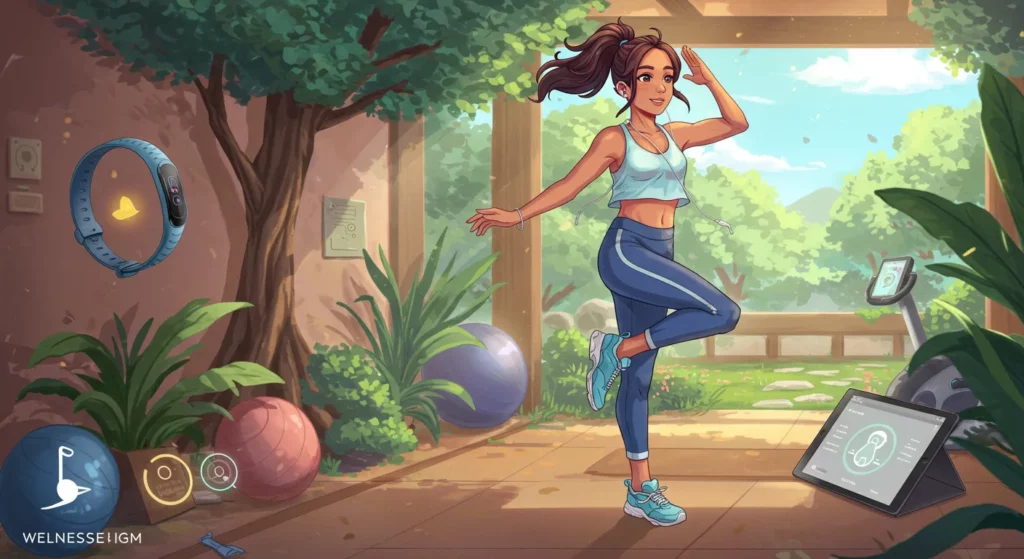Once, I thought coaching was just about cheering on executives in glass-walled offices, but my mate Jess swears her running coach speaks exclusively in memes and data analytics now. Coaching is no longer a one-size-fits-all gig; it’s exploding in all sorts of wild directions. Whether you’re into wellness apps, gaming your habits, or even tackling trauma, there’s a coaching path that’s probably weirder and more wonderful than you expect. Grab your keep cup—let’s have a good stickybeak into the modern world of coaching.
From Boardrooms to Bedrooms: The Digital Coaching Boom
If you’d told me a few years ago that most of my coaching would happen from my lounge room, I probably would’ve laughed. Yet here I am, pyjamas on, laptop open, cuppa in hand, and clients dialling in from all over the country. Digital Coaching has well and truly arrived, and it’s changing the way both coaches and clients experience personal and professional growth.
It’s not just about convenience, though that’s a huge part of it. The rise of Remote Work has made coaching more accessible than ever. I can chat with someone in Sydney while they’re sipping coffee in Perth, and neither of us has to brave traffic or hunt for a parking spot. As I often say to friends,
Digital coaching gives me the freedom to coach someone from Sydney while they sip coffee in Perth—how good’s that?
Zoom Sessions and the Pyjama Revolution
Let’s be honest: the shift to digital coaching started as a necessity, but it’s become a preference for many. Zoom sessions over a cuppa have replaced the old boardroom meetings. There’s a certain comfort in knowing you can have a deep, meaningful session without ever leaving your home. And yes, sometimes that means working in pyjamas. Don’t judge—it works.
But it’s not just about being comfy. Research shows that Digital Coaching is becoming increasingly popular because it saves time and money for both coaches and clients. There’s no need to rent a fancy office space or commute across town. Everything happens online, which means more flexibility and less overhead.
Apps, Wearables, and AI Tools: The New Coaching Toolkit
The tech side of coaching is where things get really interesting. These days, coaching isn’t just about talking things through on a call. Apps, wearables, and AI Tools are changing the game for everyone involved. I’ve seen clients use fitness trackers to monitor their sleep, stress, and exercise, then share that data with me through coaching apps. It’s a whole new level of personalisation.
AI Tools, like chatbots and virtual assistants, are now delivering tailored advice and support—sometimes 24/7. If a client has a question at midnight, they can get instant feedback from an AI-powered app. As a coach, I can use these tools to track progress, set reminders, and even suggest resources based on real-time data. It’s not about replacing the human touch, but about enhancing it.
- Personalised dashboards let clients see their progress at a glance.
- Wearables sync with coaching apps to provide real-time feedback.
- AI chatbots offer support outside of traditional session hours.
Studies indicate that this tech-driven approach is making coaching more engaging and effective. Clients feel more supported, and coaches can offer more targeted advice. It’s a win-win.
Remote Work and the Rise of Niche Coaching
Remote Work isn’t just a passing trend—it’s reshaping the coaching landscape. More people are working from home, which means they’re looking for support with things like work-life balance, stress management, and even sleep coaching. These niche areas are flourishing in digital spaces, where clients can access help without the pressure of face-to-face meetings.
I’ve noticed a real uptick in requests for coaching around topics like managing remote teams, dealing with isolation, and building healthy routines at home. The flexibility of digital coaching means I can tailor sessions to fit around a client’s workday, whether that’s early in the morning or late at night.
The demand for specialised coaching is also driving innovation. New apps are popping up all the time, each offering unique features for different coaching niches. Some use gamification to keep clients motivated, while others focus on mental health and wellbeing. The options are almost endless.
Why Digital Coaching Works
At the heart of it, Digital Coaching is about meeting people where they are—literally and figuratively. It’s about using technology to break down barriers, offer support, and help clients achieve their goals in a way that fits their lifestyle. Whether it’s through a video call, an AI-powered app, or a wearable device, the possibilities keep expanding.
As coaching trends continue to evolve, one thing’s clear: the digital boom isn’t slowing down. If anything, it’s just getting started. And honestly, I’m here for it—pyjamas and all.
Mental Health Coaches: More Than Mindfulness Apps and Yoga Classes
When I first started looking into the world of Wellness Coaching, I’ll admit, I thought it was all about mindfulness apps and a few yoga classes. But as I dug deeper, it became clear that Mental Health coaching is much more than that. It’s a field that’s growing fast, and it’s not afraid to get serious about the tough stuff—trauma, chronic stress, and the real challenges people face every day.
Goodbye Bandaid Solutions: Coaches Get Real About Stress and Trauma
It’s no secret that stress is everywhere these days. Whether it’s work, family, or just the general pace of modern life, people are feeling the pressure. What’s changed is how Mental Health Coaches are stepping up. Instead of offering quick fixes or “just breathe” advice, they’re getting trained in Trauma-Informed Practices and evidence-based Stress Management strategies.
I’ve seen coaches who specialise in helping clients build resilience, not just cope. They’re using science-backed tools to help people understand their stress triggers, set boundaries, and recover from burnout. It’s a shift away from bandaid solutions, and honestly, it feels overdue.
From Talking Therapy to Everyday Wellbeing
Traditional therapy has its place, but Mental Health Coaching is carving out a new space. It’s less about diagnosing or treating mental illness and more about supporting day-to-day wellbeing. Coaches work alongside clients to create healthy routines, build positive habits, and tackle challenges as they come up.
There’s a real focus on practical change. I’ve noticed more coaches using daily check-ins, habit tracking, and even simple journaling to help clients stay on track. It’s about making mental health part of everyday life, not just something you think about when things go wrong.
Gamification: Making Mental Health Habits Stick
One of the most unexpected—and honestly, fun—developments in Wellness Coaching is the use of Gamification. If you’ve ever played a game and felt that little rush when you level up or unlock a new badge, you’ll get the idea. Coaches and coaching apps are tapping into this by adding points, streaks, and challenges to the process of building mental health habits.
Research shows that these little wins and dopamine hits can make a big difference. Clients stay motivated, they keep coming back, and the habits actually stick. I remember watching my client unlock a new ‘level’ in their meditation habit app and thinking,
Watching my client unlock a new ‘level’ in their meditation habit app was honestly more exciting than any video game—coaching’s got game!
It’s not just about fun, though. Gamification helps break down big, overwhelming goals into smaller, manageable steps. It’s easier to keep going when you can see your progress, and a bit of friendly competition never hurts either.
Tech-Driven Coaching: More Than Just Apps
The rise of digital coaching platforms has made Mental Health and Wellness Coaching more accessible than ever. With remote work on the rise, people want support that fits into their lives. Coaching apps now offer real-time feedback, personalised recommendations, and even 24/7 access to resources.
What’s interesting is how these tools are being used for more than just meditation or breathing exercises. Some platforms are expanding into sleep coaching, chronic disease management, and even scenario-based learning with virtual reality. The goal is to support every aspect of wellbeing, not just one piece of the puzzle.
Specialisation and Demand: Why Mental Health Coaches Matter Now
There’s a growing awareness that mental health challenges are complex and ongoing. More people are looking for support that goes beyond the basics. That’s why we’re seeing an expansion of coaching specialisations—coaches who focus on trauma, stress management, or resilience, often with advanced training in Trauma-Informed Practices.
Studies indicate that this demand is only going to increase as people seek out practical, everyday support for their mental health. Whether it’s through gamified apps, one-on-one sessions, or group coaching, the message is clear: Mental Health Coaches are here to help people thrive, not just survive.
Coaching in the Sci-Fi Lane: AI, Wearables & VR
When I first stumbled into the world of coaching, I never imagined I’d be swapping notes with an AI chatbot or strapping on a VR headset to practice tough conversations. Yet here we are, living in an age where coaching has started to look less like a quiet chat in a coffee shop and more like something out of a sci-fi flick. If you’re curious about what’s really going on behind the scenes in modern coaching, let me take you on a quick tour through the wildest tech trends shaping the industry right now.
Let’s start with AI Coaching. It’s not just a buzzword—AI tools are genuinely changing the way coaches and clients interact. These days, it’s common for coaches to use AI-powered chatbots to keep in touch with clients between sessions. The bots offer reminders, encouragement, and sometimes even a bit of cheeky banter. I’ll admit, I’ve named mine ‘CoachBot,’ and honestly, it’s got better banter than half my mates. But jokes aside, AI tools are making coaching more accessible and responsive. Clients can get support 24/7, and the AI learns from their habits, offering personalised recommendations and real-time feedback. Research shows this kind of tech-driven wellness support is helping people stick to their goals, whether it’s managing stress, improving sleep, or just remembering to drink more water.
Then there’s the rise of wearables. If you’ve ever worn a smartwatch or fitness tracker, you’ll know how addictive those little nudges can be. Now, imagine your coach getting real-time updates on your steps, sleep, or even your heart rate during a stressful week. It sounds a bit futuristic, but it’s happening. Coaches are using data from wearables to tailor their advice and interventions. If a client’s sleep data shows they’re not getting enough rest, a coach might focus on sleep hygiene or stress management that week. It’s all about using real data to make coaching more targeted and effective. And for clients, it means their progress isn’t just measured by how they feel on the day—they’ve got hard numbers to back it up.
But perhaps the most surprising twist in this journey is the use of Virtual Reality (VR) in coaching. VR’s not just for gamers anymore. Some coaches are using it to create immersive, scenario-based learning experiences. Imagine putting on a headset and practicing your next big presentation in a virtual boardroom, or rehearsing a tough conversation with a virtual colleague who reacts in real time. It’s a bit surreal at first, but it’s proving to be a powerful tool for building confidence and skills in a safe, controlled environment. Research indicates that VR is especially useful in niche areas like leadership development, public speaking, and stress rehearsal. It’s early days, but the potential is huge.
All this tech might sound a bit over the top, but it’s really about making coaching more effective and more accessible. AI Coaching tools and wearables mean support doesn’t stop when the session ends. Clients can get nudges, feedback, and encouragement whenever they need it. And for coaches, it opens up new ways to connect and help people, no matter where they are in the world. Tech-driven wellness coaching is expanding fast, moving into areas like chronic disease management and mental health. There’s even a bit of gamification sneaking in, with apps turning progress tracking into a kind of personal challenge.
Coaching with AI is like having a digital sidekick—I’ve named mine ‘CoachBot’ and I reckon it’s got better banter than half my mates.
Of course, it’s not all smooth sailing. There are still questions about privacy, data security, and whether technology can ever fully replace the human touch. But from what I’ve seen, the best results come when coaches use these tools to enhance—not replace—the real relationships at the heart of coaching.
So, if you’re thinking about becoming a coach, or just curious about where the industry’s headed, don’t be surprised if your next coaching session involves a chatbot, a wearable, or even a VR headset. The coaching world is moving fast, and it’s only getting wilder from here.
TL;DR: Coaching’s no longer just about pep talks—tech, specialisation, and creative methods are remaking the field, opening doors for anyone keen to make a positive impact.



